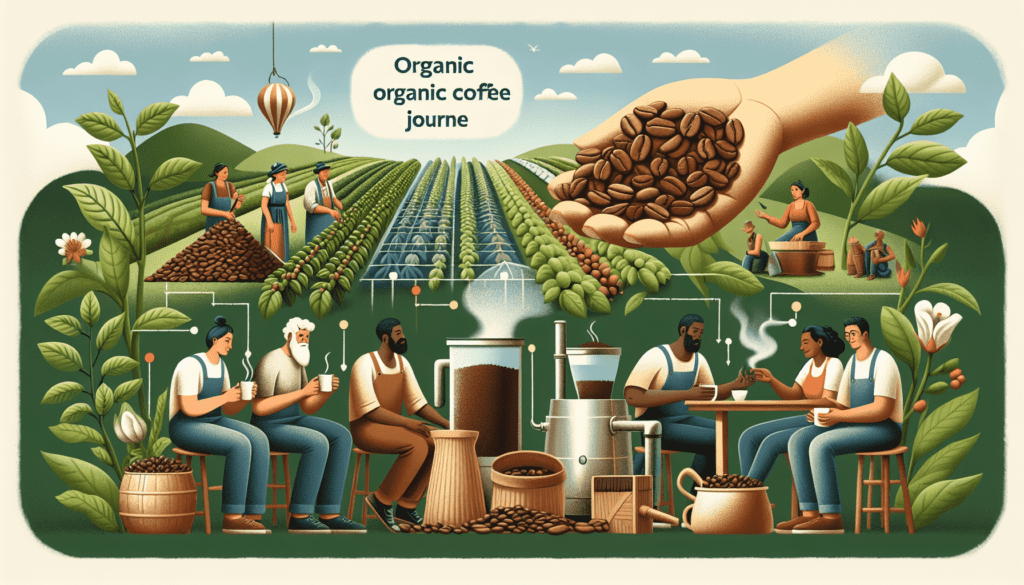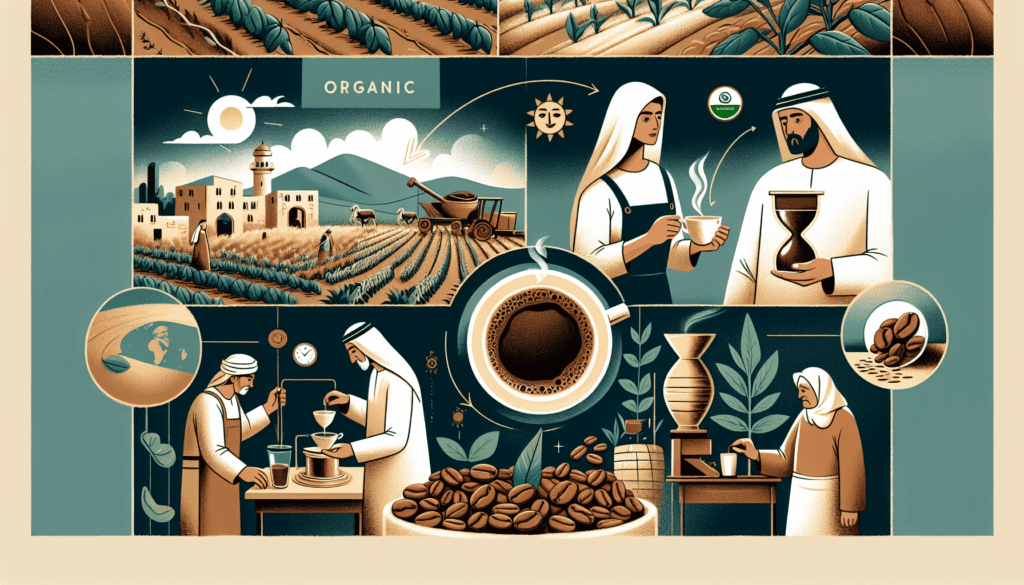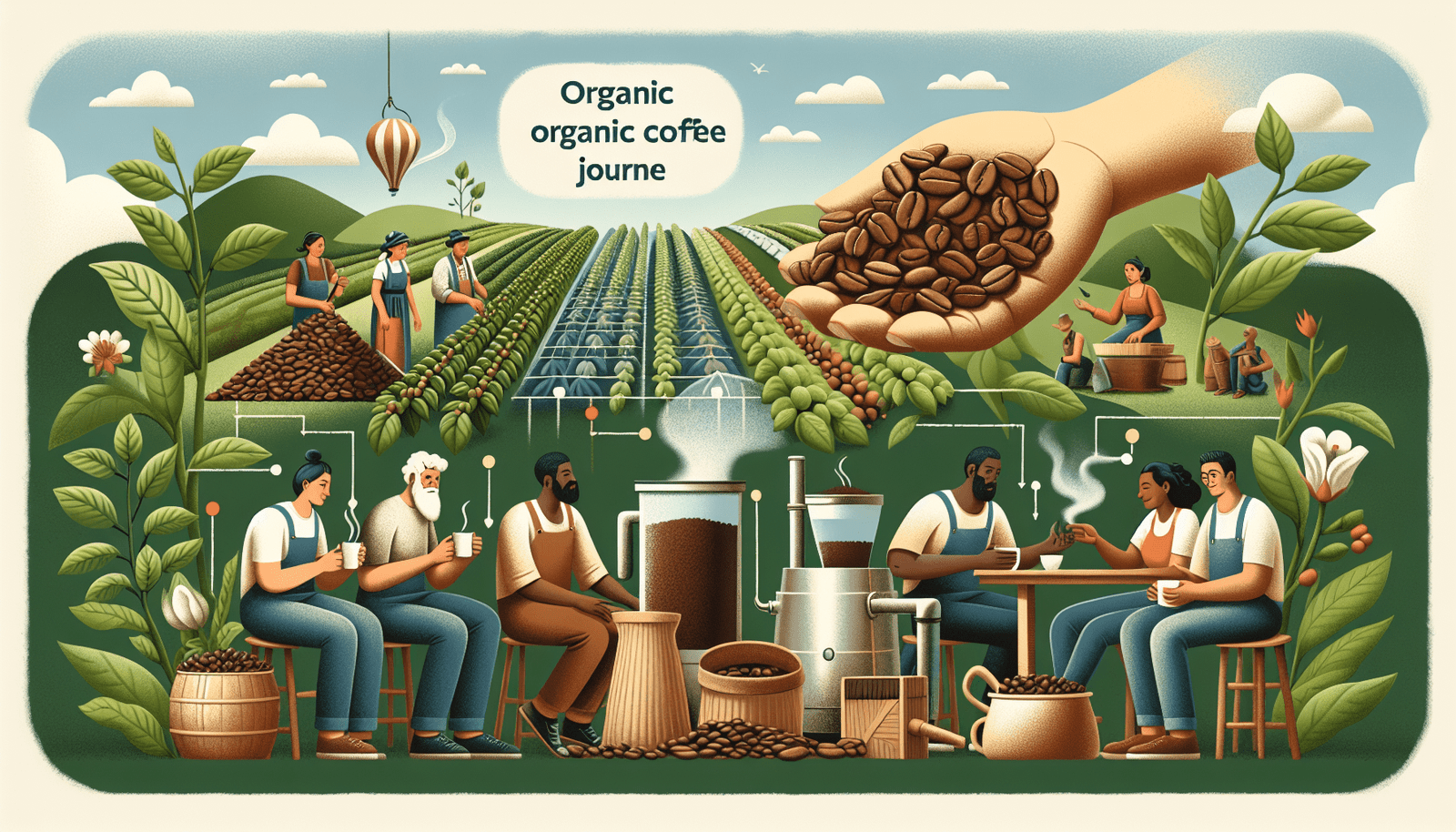If you’re passionate about coffee, then you know that it’s not just a beverage, it’s an experience. The world of coffee beans is vast and fascinating, with a variety of flavors, origins, and brewing methods to explore. From the boldness of arabica coffee beans to the unique process of civet coffee, there’s always something new and exciting to discover. And if you’re looking for a more sustainable option, organic coffee beans are a great choice. In this article, we’ll take you on a journey through the world of coffee beans, from their origins to their storage and shelf life. So grab a cup of your favorite brew and get ready to dive into the wonderful world of organic coffee beans.
What are organic coffee beans?
Definition of organic coffee beans
Organic coffee beans are coffee beans that have been grown and produced using organic farming practices. These practices exclude the use of synthetic fertilizers, pesticides, herbicides, and other chemicals. Instead, organic coffee farmers rely on natural and sustainable methods to ensure the health and integrity of the coffee plants and the surrounding environment.
Difference between organic and conventional coffee beans
The main difference between organic and conventional coffee beans lies in the farming methods used during cultivation. Conventional coffee beans are often grown using synthetic chemicals and fertilizers, which can have detrimental effects on the ecosystem and the health of farm workers. On the other hand, organic coffee beans are grown without the use of these harmful substances, promoting a more sustainable and environmentally-friendly approach to coffee production.
Benefits of choosing organic coffee beans
There are several benefits to choosing organic coffee beans. Firstly, organic coffee is free from synthetic chemicals, pesticides, and herbicides, which makes it a healthier option for both the consumer and the environment. Organic farming practices also help to preserve biodiversity and protect ecosystems by promoting sustainable agriculture. Additionally, supporting organic coffee farmers encourages fair trade practices and ensures that they receive fair compensation for their hard work. Overall, choosing organic coffee beans allows you to enjoy a cup of coffee that is not only delicious but also ethically and environmentally responsible.
How are organic coffee beans grown?
Organic farming practices
Organic coffee beans are grown using a variety of organic farming practices. These practices include the use of compost and natural fertilizers to enhance soil fertility and quality, as well as the use of beneficial insects and birds to control pests and maintain a balanced ecosystem. Organic farmers also employ crop rotation techniques to prevent soil depletion and promote better plant health. By avoiding the use of synthetic chemicals, organic coffee farmers prioritize the long-term health of the soil, plants, and surrounding environment.
Certification process for organic coffee beans
To ensure that coffee beans meet the organic standards, they must go through a certification process. This process involves inspections and evaluations by certified organic agencies to verify that the coffee farm follows all organic farming practices and meets the required criteria. The certification process varies depending on the country, but it generally involves regular inspections, documentation, and testing to ensure compliance with organic standards. Once certified, the coffee beans can be labeled and sold as organic, giving consumers confidence in the product’s quality and integrity.
Sustainable and environmentally-friendly methods
One of the key principles of organic coffee farming is sustainability. Organic coffee farmers strive to minimize their environmental impact by focusing on conservation and preserving natural resources. They prioritize water and energy conservation, as well as waste reduction and proper disposal. By adopting these sustainable practices, organic coffee farmers contribute to the health and longevity of the surrounding ecosystems, ensuring that future generations can continue to enjoy the benefits of the land.

Advantages of choosing organic coffee beans
Health benefits of organic coffee beans
Choosing organic coffee beans can have various health benefits. Since organic coffee is grown without synthetic chemicals and pesticides, it reduces the risk of pesticide exposure for both the consumer and the farmers. This can be particularly beneficial for individuals with sensitivities or allergies to these substances. Organic coffee is also believed to have higher levels of antioxidants compared to conventionally grown coffee, which can provide additional health benefits such as protection against oxidative stress and inflammation.
Reduced exposure to pesticides and chemicals
By choosing organic coffee beans, you can significantly reduce your exposure to pesticides and other harmful chemicals. Conventionally grown coffee beans are often heavily sprayed with synthetic pesticides and herbicides, which can leave residue on the beans. When consumed, these residues may pose health risks. Organic coffee beans, on the other hand, are grown without the use of these chemicals, ensuring a cleaner and healthier cup of coffee.
Supporting sustainable agriculture and biodiversity
Organic coffee farming promotes sustainable agricultural practices that prioritize the long-term health and preservation of the ecosystem. By choosing organic coffee beans, you are supporting farmers who are committed to protecting the environment, promoting biodiversity, and preserving natural resources. Organic coffee farms provide habitats for a wide range of plant and animal species, contributing to the overall health and balance of the surrounding ecosystems. By supporting organic coffee, you are actively participating in the conservation of our planet.
Popular varieties of organic coffee beans
Arabica vs. Robusta organic coffee beans
When it comes to organic coffee beans, the two most popular varieties are Arabica and Robusta. Arabica beans are known for their superior quality, mild flavor, and aromatic profile. They have a lower caffeine content compared to Robusta beans and are often favored by those who enjoy a smoother and more nuanced cup of coffee. On the other hand, Robusta beans are known for their higher caffeine content and stronger, more bitter flavor profile. They are often used in espresso blends for their bold and rich flavors.
Single origin vs. blend organic coffee beans
Organic coffee beans can be categorized as single-origin or blends. Single-origin beans come from a specific region or farm, and they showcase the unique characteristics and flavors of that particular area. They are often highly regarded for their distinct taste profiles and are favored by coffee connoisseurs. Blends, on the other hand, are a combination of beans from different regions or farms. They are carefully crafted to achieve a balanced flavor profile that appeals to a wider range of palates.
Unique flavors and profiles
Organic coffee beans offer a wide range of unique flavors and profiles that cater to different taste preferences. From chocolatey and nutty notes to fruity and floral profiles, there is a coffee bean to suit every palate. Each region and farm has its own distinct characteristics that are influenced by factors such as altitude, climate, soil composition, and cultivation techniques. Exploring the world of organic coffee beans allows you to discover new and exciting flavor experiences that will keep your taste buds satisfied.

Tips for storing organic coffee beans
Choosing the right storage container
To maintain the freshness and flavor of your organic coffee beans, it’s important to choose the right storage container. Ideally, you want a container that is airtight and opaque to prevent light, moisture, and air from deteriorating the quality of the beans. Glass jars with airtight lids or specially designed coffee storage containers with one-way valves are excellent options for keeping your beans fresh.
Ideal storage conditions
To ensure the longevity of your organic coffee beans, store them in a cool and dry place. Avoid exposure to direct sunlight, heat, and humidity as these factors can accelerate the degradation of the beans. The ideal storage temperature for coffee beans is around 10 to 15 degrees Celsius (50 to 59 degrees Fahrenheit). Refrigeration or freezing is not recommended, as the moisture can negatively affect the flavor and quality of the beans.
Avoiding moisture and light exposure
Moisture and light exposure can significantly impact the freshness and flavor of your organic coffee beans. Moisture can lead to the growth of mold and spoilage, while light exposure can cause oxidation and degradation of the beans’ natural oils and flavors. Therefore, it’s essential to store your coffee beans in a dry, dark place away from sources of moisture and light. By protecting your beans from these elements, you can ensure that they stay fresh and delicious for a longer period.
How to grind organic coffee beans
Different grind sizes for brewing methods
The appropriate grind size for your organic coffee beans depends on the brewing method you intend to use. Different brewing methods require different grind sizes to achieve the optimal extraction of flavors. For example, a fine grind is typically used for espresso, while a coarse grind is suited for French press brewing. Understanding the grind size for your preferred brewing method will help you achieve the perfect cup of coffee.
Manual vs. electric coffee grinders
When it comes to grinding organic coffee beans, you have the option of using a manual or electric coffee grinder. Manual grinders require physical effort to grind the beans but offer more control over the grind size. Electric grinders, on the other hand, are quicker and more convenient, especially when grinding large batches of beans. Both options can effectively grind your organic coffee beans, so choose the one that best suits your needs and preferences.
Tips for achieving the perfect grind
To achieve the perfect grind for your organic coffee beans, consider the following tips:
- Adjust the grind size based on your brewing method. Finer grinds for espresso, medium grinds for pour-over or drip coffee, and coarse grinds for French press.
- Grind just before brewing to preserve the freshness and flavors of the beans.
- Be consistent with your grind size to ensure even extraction.
- Experiment with different grind sizes and brewing parameters to find the flavor profile that suits your taste.
Brewing methods for organic coffee beans
French press
The French press brewing method is popular for its simplicity and ability to extract bold flavors from organic coffee beans. To brew with a French press, coarsely grind your coffee beans and add them to the press. Pour hot water over the grounds, let them steep for a few minutes, and then press the plunger down to separate the coffee grounds from the brewed coffee. The result is a rich and full-bodied cup of coffee.
Pour-over
For a clean and nuanced cup of coffee, the pour-over method is an excellent choice. Start by placing a filter in a pour-over dripper or a Chemex. Moisten the filter with hot water to remove any paper taste. Then, add your medium-sized ground organic coffee beans and slowly pour hot water in a circular motion over the grounds. Allow the coffee to drip through the filter and into your cup. This method allows for precise control over the brewing process and produces a clean, well-balanced cup of coffee.
Espresso machine
If you enjoy a concentrated and full-bodied coffee experience, an espresso machine is the way to go. To brew espresso with organic coffee beans, use a fine grind and pack it tightly into the portafilter. Attach the portafilter to the espresso machine and run hot water through the coffee grounds under high pressure. The result is a rich, intense shot of espresso that can be enjoyed as is or used as a base for various espresso-based beverages.
Cold brew
Cold brew coffee is known for its smooth and less acidic flavor profile. To make cold brew with organic coffee beans, coarsely grind the beans and combine them with cold water in a container. Let the mixture steep in the refrigerator for 12 to 24 hours, depending on your desired strength. Once steeped, strain the coffee concentrate and dilute it with water or milk to taste. Cold brew is perfect for hot summer days or for those who prefer a less acidic coffee experience.
Other popular methods
There are several other popular brewing methods for organic coffee beans, including Aeropress, Moka pot, and drip brewing machines. Each method offers a unique brewing experience and allows you to explore different flavor profiles and intensities. Experimenting with various brewing methods can help you discover your favorite way to enjoy your organic coffee beans.
Exploring the world of organic coffee bean flavors
Chocolatey and nutty notes
Organic coffee beans often exhibit chocolatey and nutty flavor profiles that are loved by many coffee enthusiasts. These flavors can range from dark chocolate and roasted nuts to caramel and hazelnut. The richness and depth of these flavors can complement various brewing methods and make for a comforting and indulgent cup of coffee.
Fruity and floral profiles
Some organic coffee beans offer fruity and floral flavor profiles that can add a refreshing and vibrant touch to your coffee experience. These flavors can include notes of berries, citrus fruits, tropical fruits, and even floral undertones. Brewing methods that highlight these flavors, such as pour-over or cold brew, can help bring out the bright and aromatic characteristics of the organic coffee beans.
Spices and exotic taste experiences
Exploring the world of organic coffee beans can also introduce you to flavors that are exotic and adventurous. Some coffee beans exhibit spicy notes like cinnamon, clove, or cardamom, adding a unique twist to your cup of coffee. These flavors can be especially enticing for those who enjoy exploring the boundaries of taste and seeking new and exciting sensory experiences.
Understanding the caffeine content in organic coffee beans
Arabica vs. Robusta caffeine levels
The caffeine content in organic coffee beans can vary depending on the variety. Generally, Robusta beans have a higher caffeine content compared to Arabica beans. Robusta beans typically contain around 2.7% caffeine, while Arabica beans contain approximately 1.5% caffeine. However, it’s important to note that the brewing method and serving size can also influence the overall caffeine content in a cup of coffee.
How roasting affects caffeine content
The roasting process of coffee beans can also impact the caffeine content. Contrary to popular belief, darker roasts do not necessarily have less caffeine than lighter roasts. While the roasting process can slightly reduce the caffeine content overall, the differences are minimal. The main effect of roasting is the alteration of the flavor and aroma compounds in the coffee beans.
Factors that influence caffeine extraction
The caffeine content in a cup of coffee is influenced by various factors, including the brewing method, coffee-to-water ratio, water temperature, and brew time. For example, brewing methods that involve longer extraction times, such as French press or cold brew, tend to extract more caffeine compared to methods like espresso or drip brewing. Experimenting with these variables can help you find the right balance of caffeine in your cup of organic coffee.
Ethical considerations of organic coffee beans
Fair trade and organic certifications
Choosing organic coffee beans often goes hand in hand with supporting fair trade practices. Fair trade certifications ensure that coffee farmers receive fair wages and are provided with safe working conditions. By purchasing organic and fair trade certified coffee beans, you are actively contributing to the well-being and livelihoods of coffee farmers around the world.
Supporting coffee farmers
Organic coffee farming can be more labor-intensive and challenging compared to conventional methods. By choosing organic coffee beans, you are supporting the hard work and dedication of coffee farmers who prioritize sustainable and environmentally-friendly practices. Your support helps them continue their important work while promoting a more sustainable and equitable coffee industry.
Ensuring sustainable livelihoods
Organic coffee farming not only benefits the environment but also helps to ensure the sustainable livelihoods of coffee farming communities. By supporting organic coffee beans, you are directly contributing to the economic stability and well-being of these communities. This allows coffee farmers to secure a better future for themselves and their families, ensuring the longevity of the coffee industry as a whole.
In conclusion, organic coffee beans offer a world of flavors, health benefits, and ethical considerations that make them a popular choice among coffee enthusiasts. From their cultivation using organic farming practices to the various brewing methods that bring out their unique characteristics, organic coffee beans provide a delightful and sustainable coffee experience. Whether you enjoy the boldness of Robusta or the nuanced flavors of Arabica, there is an organic coffee bean waiting to be brewed into your perfect cup of coffee. So choose organic, support sustainable agriculture, and savor the rich flavors that nature has to offer.

